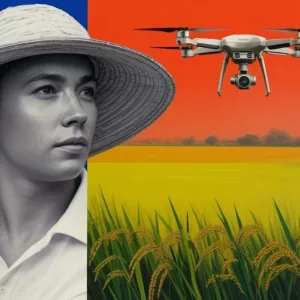A revolution for all? Weighing the promises and pitfalls of Agriculture 4.0
(Image generated by AI) By Varunseelan Murugaiyan and Glenn Concepcion The global food system is facing unprecedented pressures. Rising production costs, chronic labor shortages, dwindling natural resources, and accelerating climate change are forcing agriculture to adapt. Many scientists and policymakers look to the Fourth Agricultural Revolution, called Agriculture 4.0, which aims to integrate digital technologies into farming. Agriculture 3.0, the

A revolution for all? Weighing the promises and pitfalls of Agriculture 4.0
(Image generated by AI)
By Varunseelan Murugaiyan and Glenn Concepcion
The global food system is facing unprecedented pressures. Rising production costs, chronic labor shortages, dwindling natural resources, and accelerating climate change are forcing agriculture to adapt. Many scientists and policymakers look to the Fourth Agricultural Revolution, called Agriculture 4.0, which aims to integrate digital technologies into farming.
Agriculture 3.0, the Green Revolution of the 1960s to 1990s, boosted yields and helped feed a rapidly growing population. But its reliance on intensive inputs also contributed to groundwater depletion, biodiversity loss, and environmental damage. Agriculture 4.0, proponents argue, could deliver a more sustainable alternative by using digital tools such as the Internet of Things (IoT), artificial intelligence (AI), Big Data analytics, robotics, and drones.
However, a new review published in Discover Food cautions that while the promise of this ‘techno-green revolution’ is immense, its adoption is slow and uneven, threatening to leave small-scale farmers behind.

